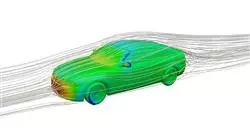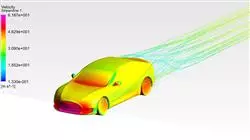University certificate
The world's largest faculty of information technology”
Introduction to the Program
Enrol now and become an expert in CFD Techniques "

Computational Fluid Dynamics (CFD) techniques are used to simulate the motion of fluids, so their applications in the field of research are multiple and very valuable. Among its many advantages are cost savings, time savings and its quality in simulating or analyzing conditions that would be much more complicated with other methods. Understanding these techniques and getting the most out of them requires advanced knowledge and skills.
For this reason, TECH Global University has designed a Postgraduate diploma in CFD Techniques , to provide students with the necessary skills to be able to undertake professional work of the highest quality and efficiency in this field. And this, through the study of topics such as Supercomputing Environments, 1D and 2D applications, input and physical model uncertainties or the Finite Element Method (FEM), among many other relevant aspects.
All of this, with total freedom for the student so that they can organize their study timetables and combine them with their other day-to-day activities, thanks to a convenient 100% online mode. In addition, with the most complete content, the most up-to-date information and the most innovative multimedia teaching materials, which have been designed by TECH Global University outstanding team of CFD experts.
Stand out in a booming sector and achieve your most demanding goals in the field of Computational Fluid Dynamics"
This Postgraduate diploma in CFD Techniques contains the most complete and up-to-date program on the market. The most important features include:
- The development of case studies presented by experts in CFD Techniques
- The graphic, schematic, and practical contents with which they are created, provide scientific and practical information on the disciplines that are essential for professional practice
- Practical exercises where self-assessment can be used to improve learning
- Its special emphasis on innovative methodologies
- Theoretical lessons, questions to the expert, debate forums on controversial topics, and individual reflection assignments
- Content that is accessible from any fixed or portable device with an Internet connection
Access all the content in Advanced Methods for CFD, from day one and with total freedom"
The program’s teaching staff includes professionals from the sector who contribute their work experience to this training program, as well as renowned specialists from leading societies and prestigious universities.
Its multimedia content, developed with the latest educational technology, will allow the professional a situated and contextual learning, that is, a simulated environment that will provide an immersive training programmed to train in real situations.
The design of this program focuses on Problem-Based Learning, in which the professional will have to try to solve the different professional practice situations that will arise throughout the academic course. For this purpose, the student will be assisted by an innovative interactive video system created by renowned experts.
Acquire new skills through experimentation with collision operators or turbulence models"

Thanks to the most complete theoretical and practical material, you will be able to test your new competences in Supercomputing Environments"
Why study at TECH?
TECH is the world’s largest online university. With an impressive catalog of more than 14,000 university programs available in 11 languages, it is positioned as a leader in employability, with a 99% job placement rate. In addition, it relies on an enormous faculty of more than 6,000 professors of the highest international renown.

Study at the world's largest online university and guarantee your professional success. The future starts at TECH”
The world’s best online university according to FORBES
The prestigious Forbes magazine, specialized in business and finance, has highlighted TECH as “the world's best online university” This is what they have recently stated in an article in their digital edition in which they echo the success story of this institution, “thanks to the academic offer it provides, the selection of its teaching staff, and an innovative learning method aimed at educating the professionals of the future”
A revolutionary study method, a cutting-edge faculty and a practical focus: the key to TECH's success.
The most complete study plans on the university scene
TECH offers the most complete study plans on the university scene, with syllabuses that cover fundamental concepts and, at the same time, the main scientific advances in their specific scientific areas. In addition, these programs are continuously being updated to guarantee students the academic vanguard and the most in-demand professional skills. In this way, the university's qualifications provide its graduates with a significant advantage to propel their careers to success.
TECH offers the most comprehensive and intensive study plans on the current university scene.
A world-class teaching staff
TECH's teaching staff is made up of more than 6,000 professors with the highest international recognition. Professors, researchers and top executives of multinational companies, including Isaiah Covington, performance coach of the Boston Celtics; Magda Romanska, principal investigator at Harvard MetaLAB; Ignacio Wistumba, chairman of the department of translational molecular pathology at MD Anderson Cancer Center; and D.W. Pine, creative director of TIME magazine, among others.
Internationally renowned experts, specialized in different branches of Health, Technology, Communication and Business, form part of the TECH faculty.
A unique learning method
TECH is the first university to use Relearning in all its programs. It is the best online learning methodology, accredited with international teaching quality certifications, provided by prestigious educational agencies. In addition, this disruptive educational model is complemented with the “Case Method”, thereby setting up a unique online teaching strategy. Innovative teaching resources are also implemented, including detailed videos, infographics and interactive summaries.
TECH combines Relearning and the Case Method in all its university programs to guarantee excellent theoretical and practical learning, studying whenever and wherever you want.
The world's largest online university
TECH is the world’s largest online university. We are the largest educational institution, with the best and widest online educational catalog, one hundred percent online and covering the vast majority of areas of knowledge. We offer a large selection of our own degrees and accredited online undergraduate and postgraduate degrees. In total, more than 14,000 university degrees, in eleven different languages, make us the largest educational largest in the world.
TECH has the world's most extensive catalog of academic and official programs, available in more than 11 languages.
Google Premier Partner
The American technology giant has awarded TECH the Google Google Premier Partner badge. This award, which is only available to 3% of the world's companies, highlights the efficient, flexible and tailored experience that this university provides to students. The recognition as a Google Premier Partner not only accredits the maximum rigor, performance and investment in TECH's digital infrastructures, but also places this university as one of the world's leading technology companies.
Google has positioned TECH in the top 3% of the world's most important technology companies by awarding it its Google Premier Partner badge.
The official online university of the NBA
TECH is the official online university of the NBA. Thanks to our agreement with the biggest league in basketball, we offer our students exclusive university programs, as well as a wide variety of educational resources focused on the business of the league and other areas of the sports industry. Each program is made up of a uniquely designed syllabus and features exceptional guest hosts: professionals with a distinguished sports background who will offer their expertise on the most relevant topics.
TECH has been selected by the NBA, the world's top basketball league, as its official online university.
The top-rated university by its students
Students have positioned TECH as the world's top-rated university on the main review websites, with a highest rating of 4.9 out of 5, obtained from more than 1,000 reviews. These results consolidate TECH as the benchmark university institution at an international level, reflecting the excellence and positive impact of its educational model.” reflecting the excellence and positive impact of its educational model.”
TECH is the world’s top-rated university by its students.
Leaders in employability
TECH has managed to become the leading university in employability. 99% of its students obtain jobs in the academic field they have studied, within one year of completing any of the university's programs. A similar number achieve immediate career enhancement. All this thanks to a study methodology that bases its effectiveness on the acquisition of practical skills, which are absolutely necessary for professional development.
99% of TECH graduates find a job within a year of completing their studies.
Postgraduate Diploma in CFD Techniques
The technological advance has generated a growing need for specialists in numerical simulation for the resolution of complex problems. Nowadays, Computational Fluid Dynamics (CFD) techniques are essential in different areas of engineering, from aeronautics to renewable energy. At the University, we have designed the CFD Techniques Expert program, in which the participant will acquire fundamental knowledge for the use and application of these techniques in the resolution of specific problems. In this program, the different areas of physics involved, the necessary mathematical formulation and the numerical implementation of the algorithms will be studied in depth. The use of the most widely used software tools for numerical simulation in CFD will also be addressed.
The Expert in CFD Techniques will also be introduced to the use of the most widely used software tools for numerical simulation in CFD.
The Expert in CFD Techniques is a specialization program designed for engineers and professionals who require specific skills in numerical simulation. The training acquired in this program will allow the professional to be at the forefront of the application of CFD techniques, which is highly valued in different companies and institutions. At the University, we provide the participants with a team of highly qualified teachers with extensive experience in the use of these techniques in the industry. In addition, the program is designed so that the participant has a practical experience in the implementation of CFD techniques, which will allow him/her to apply the knowledge acquired in the resolution of concrete problems.







